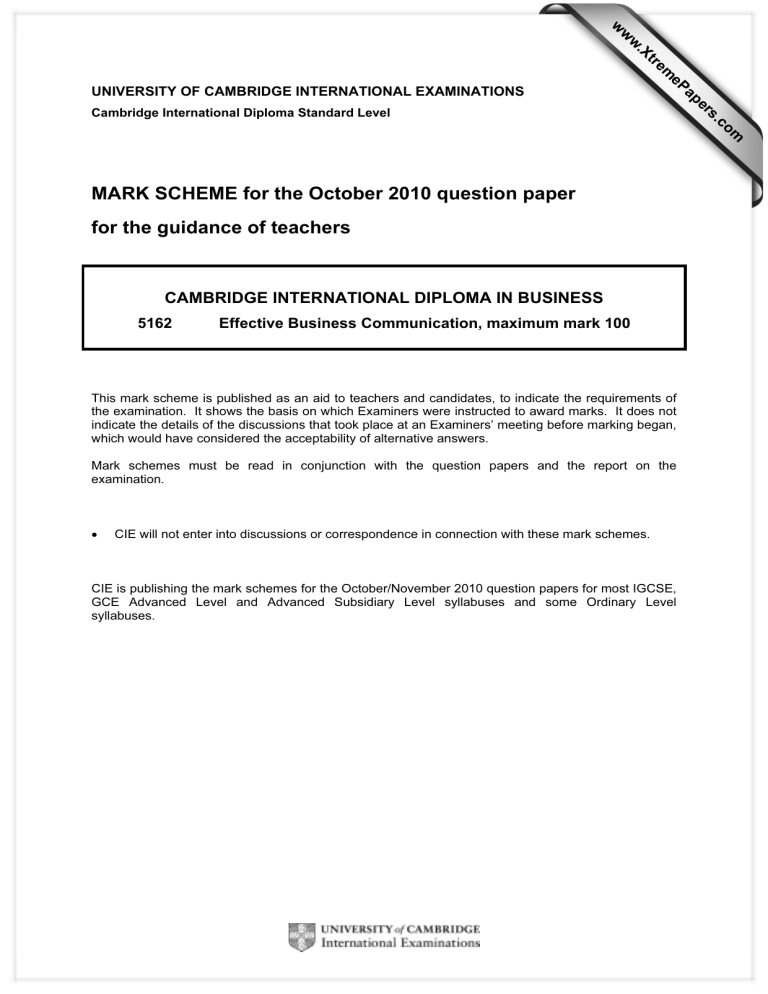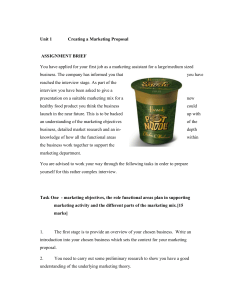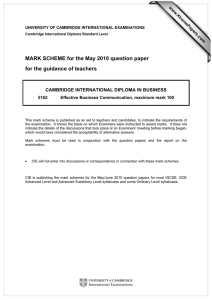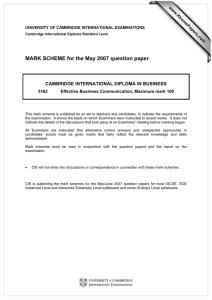MARK SCHEME for the October 2010 question paper

www.XtremePapers.com
UNIVERSITY OF CAMBRIDGE INTERNATIONAL EXAMINATIONS
Cambridge International Diploma Standard Level
MARK SCHEME for the October 2010 question paper for the guidance of teachers
CAMBRIDGE INTERNATIONAL DIPLOMA IN BUSINESS
5162 Effective Business Communication, maximum mark 100
This mark scheme is published as an aid to teachers and candidates, to indicate the requirements of the examination. It shows the basis on which Examiners were instructed to award marks. It does not indicate the details of the discussions that took place at an Examiners’ meeting before marking began, which would have considered the acceptability of alternative answers.
Mark schemes must be read in conjunction with the question papers and the report on the examination.
• CIE will not enter into discussions or correspondence in connection with these mark schemes.
CIE is publishing the mark schemes for the October/November 2010 question papers for most IGCSE,
GCE Advanced Level and Advanced Subsidiary Level syllabuses and some Ordinary Level syllabuses.
Page 2 Mark Scheme: Teachers’ version Syllabus
Cambridge International Diploma – October 2010 5162
1 Tahir Kahn is concerned that good communication must be maintained as the business grows.
Explain reasons why communication is so necessary in business. [3 × 2 = 6]
Communication is necessary for a business to operate successfully.
Business needs to convey clear messages both within the organisation and to the outside business world.
Businesses need to receive and process information effectively.
Improve communication with stakeholders: employees (all the centres), suppliers
(computers, stationery etc, customers (students), and the ICT company.
2 marks for each reason
Describe reasons why choosing the appropriate communication method is so important for business communication. [4 × 2 = 8]
Appreciate that an organisation that relies only on one-way communication methods is likely to experience business complications, e.g. a top-down manager will not receive feedback.
Organisation will be less able to respond to the changing demands of its customer, lack of two-way-communication will leave people feeling unmotivated; businesses are not selfsufficient, they need to communicate with external people and organisations.
Need to ensure selection of appropriate communication method by asking standard questions; “what is to be communicated; why is it to be communicated?, “who needs to know”?
Look at the cost effectiveness of the communication route.
The availability of the communication route – it must be accessible to both sender and receiver.
Saves time can be a reason to a maximum of 1 mark.
1 mark for effect of one-way communication
2 marks for explanation of effect on stakeholders
For each reason and explanation 2 marks
(c) Tahir Kahn wishes to start contacting potential students in Tokyo about the opening of the new school. Suggest three effective methods of communication which would be appropriate when contacting prospective new students. [3
×
2 = 6]
Letters, email, telephone, text messages, seminars, workshops and education exhibitions
Use of the Internet – web page with links to courses and email facility
Advertising in local papers, radio and TV
1 mark for method
2 marks for explanation
[Total: 20]
© UCLES 2010
Page 3 Mark Scheme: Teachers’ version Syllabus
Cambridge International Diploma – October 2010 5162
2 (a) Write a memo to Mary Fieldhouse and Jashed Iqbal inviting them to join the interview panel in London. Add any additional information which may be required. [8]
The memo must conform to company style
Logo
Date
To Panel of interviewers
From – You
Subject: Interviews
Body/content of the memo – day, time, where the interviews will take place
Appropriate conclusion
Initials or signature
4 marks for layout
4 marks for content – 1 × 4
(b) Tahir Kahn has asked you to write a letter to one of the candidates, Miss Josette De
Klerk asking her to attend the interview. Include all the information the candidate will
[12] require for the interview.
Standard business letter layout including:
Corporate image on pre-printed letter heads
Salutation (dear sir/madam)
Full address of organisation
Telephone and fax numbers
Email address
Appropriate content in a standard layout
Appropriate closure/sign off for letters (Yours faithfully and Yours sincerely)
6 marks for layout
6 marks for content – should include day, time and venue for the interview; confirm what the applicant needs to bring with them i.e. a 10 minute presentation titled ‘Teaching English in
Japan’ and that the questions will be in both English and Japanese.
Answers may also include copies of qualifications references, documentation to show right to work etc.
[Total: 20]
3 Mary Fieldhouse has asked you to organise a video conferencing meeting of the PR
English Language School Managers in order to improve the communication between them.
Identify common characteristics of a meeting. [5 × 2 = 10]
Desired aims have been identified
Members have an interest in the end decisions
Interests and action points are followed up (minutes taken)
Meeting takes place in a limited time scale
An individual has assumed leadership or been elected (Chairperson)
Agenda – 1 mark only
© UCLES 2010
Page 4 Mark Scheme: Teachers’ version
Cambridge International Diploma – October 2010
Syllabus
5162
Identify verbal and two non-verbal methods of communication used between the
Verbal tone of voice
Appropriate language used
Face-to-face
Interpretation of body language
Eye contact
Hand gestures
Active listening
1 mark for each point identified but must have 2 verbal and 2 non verbal to obtain full marks.
Explain benefits of a video conferencing meeting over more traditional ways of communicating between Managers. [2 × 2 = 4]
Faster decision making
Savings in travel expenses and time
Meetings in real time
Able to display charts etc during the meeting
Managers can meet more frequently
Critical meetings can be set up in less time
Can see the reactions of managers to other managers’ ideas
Identify factors which are shared by all groups working within an organisation.
[1 × 2 = 2]
Dress code, behaviour, group hierarchy
Sense of belonging, common goals and shared work-place
1 mark for each point identified
[Total: 20]
4 You have been asked by the Manager of the Hanoi Office for a list of steps which need to be taken for a successful recruitment interview.
(a) List the steps which will need to be taken for carrying out a recruitment interview. [10]
Decide on interview panel and date of interview and room
Short list candidates and contact
Prepare questions – open, closed, scenario or hypothesising
An interview is a two way process
Notes need to be taken
Decision made on which applicant to be appointed
Applicant contacted
1–3 marks Demonstrates a limited knowledge and understanding.
4–7 marks Demonstrates a clearer understanding of he planning stages.
8–10 marks Demonstrates a full and detailed analysis of the stages.
© UCLES 2010
Page 5 Mark Scheme: Teachers’ version Syllabus
Cambridge International Diploma – October 2010 5162
Describe different types of business interviews apart from recruitment interviews.
[5 × 2 = 10]
Employment interviews
Termination/exit interviews
Performance appraisal reviews
Medical interviews – back to work
Counselling
Grievance interviews
Disciplinary interviews
Behaviour change interview if linked to disciplinary interview
1 mark for identification
1 mark for clarification
[Total: 20]
5 There is a Board of Directors meeting taking place next month. Tahir Kahn has asked you to prepare a presentation of enrolment data for each centre.
(i) two types of visual aids which can be used to display this data. [2 × 2 = 4]
Must be:
Pie chart (or a circle graph)
“Slices of pie” scale in use is circular, representing 360 degrees
Bar Chart
Series of bars in a vertical or horizontal format representing totals or amounts of items being compared using a common scale
Explain advantage and one disadvantage of each visual aid. [4 × 2 = 8]
Pie Chart
• Advantages
Visually appealing
Shows percent of total for each category
They are an informative way to depict proportional statistical information and allow for easy comparisons.
• Disadvantages
These would be that they can only depict up to 8 slices without causing confusion.
Anymore that that could mislead readers and not convey the message you are trying to get across. Also, categories that represent less than 5% of the whole cannot be easily distinguished in the graph.
© UCLES 2010
Page 6 Mark Scheme: Teachers’ version Syllabus
Cambridge International Diploma – October 2010 5162
Bar Chart
• Advantages
Visually strong
Can easily compare two or three data sets
It shows exact quantities in real numbers, so you don’t have to convert percentages into number as with pie charts. Thus, the information is much more distinct and obvious.
• Disadvantages
If the category labels are too long, they may not fit completely on the x-axis without making it too crowded. The range of the y-axis numbers and the inexactitude of bars make it difficult to determine the exact value.
1 mark for each type of visual aid identified
1 mark for explanation of choice
2 marks for advantages
2 marks for disadvantages
Explain reasons for the use of organisation charts within an organization. [2 × 2 = 4]
Use of an organisation chart to show levels of authority and responsibility within an organisation, the lines of formal communication, the status and role of employees.
Explain software packages which can be used to enhance the visual communication in your presentation. [2 × 2 = 4]
Computer graphics from spreadsheet data e.g. Excel
Access for databases
PowerPoint to construct the organisation charts
Uses of multimedia aids in presenting information
Use of 3D presentation graphics and computer software packages to enhance slide-based information.
1 mark for the package
1 mark for explanation
[Total: 20]
© UCLES 2010






